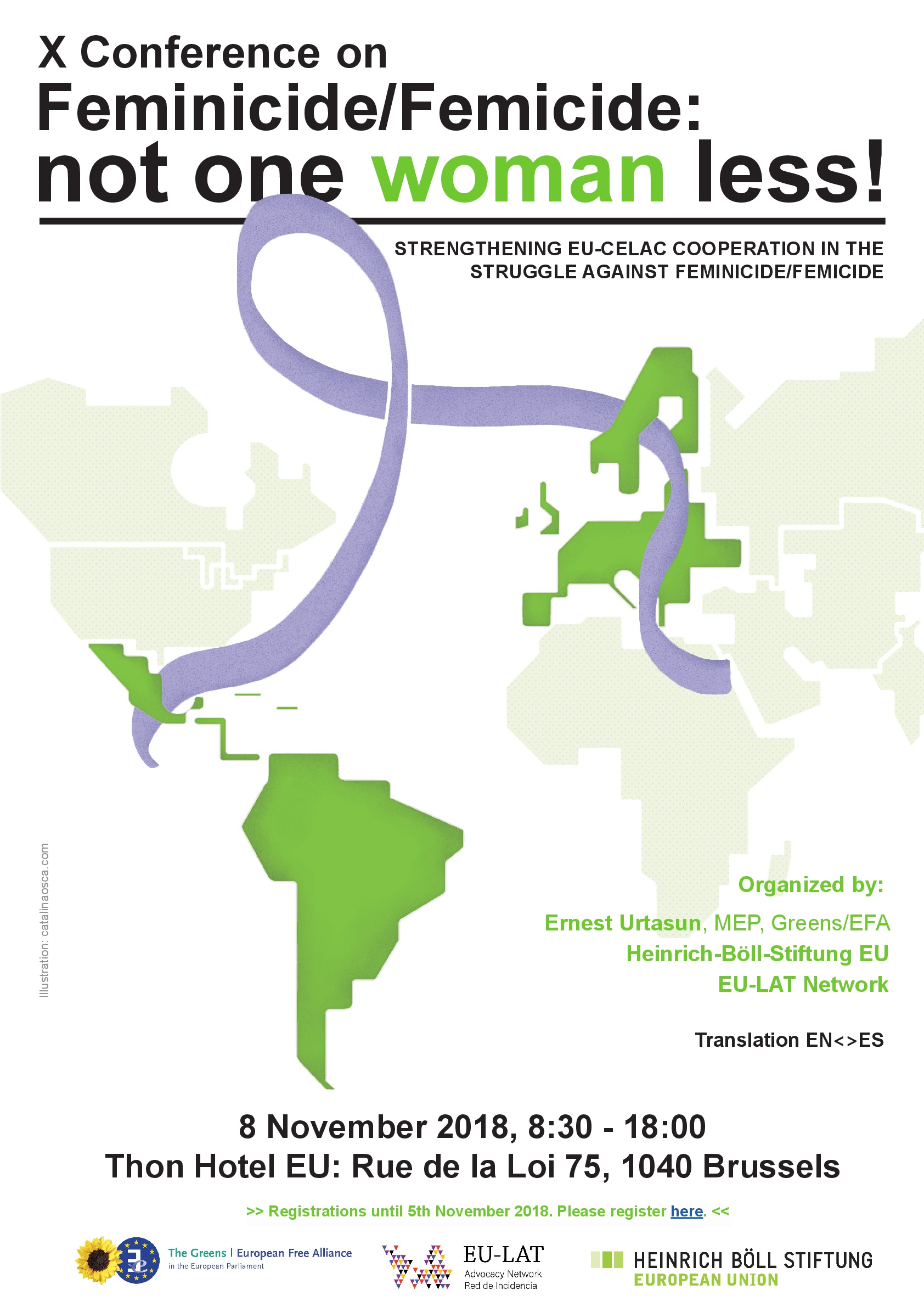Feminicide/femicide or gender-based murders of women are not isolated incidents that arise suddenly and unexpectedly, but rather, they are the ultimate manifestation of the continuum of violence against women. These violent acts that, together with their maximum exponent: feminicide/femicide, are a serious violation of human rights linked to discrimination and patriarchal structures that are deeply rooted within societies and worsened by poverty and in many cases, by high levels of impunity.
It is precisely this impunity that constitutes one of the major threats to the eradication of this phenomenon, which is often justified by reasons of culture or “tradition”. This unacceptable impunity, irrespective of its diverse forms, favours the perpetration of more crimes against women. Against that background, in recent years the EU has expressed its concern about the issue of violence against women in its various forms, as well as its most extreme manifestation: feminicide/femicide, through the adoption of various declarations and resolutions. On the 11th of October 2007, the European Parliament approved a resolution, on the murders of women in Central America and Mexico, as well as, on the role of the European Union in the fight against this phenomenon. In December 2008, the EU adopted the EU Directives on violence against women-, a gesture that clearly shows its political will to give priority to the issue in both its internal and external dimensions. In November 2009, the Inter-American Court of Human Rights condemned the Mexican State for violation of human rights –in the context of the feminicide/femicide cases which took place in Ciudad Juarez. As a consequence, the May 2010 declaration of the EU-Latin America and the Caribbean Summit, acknowledges the need to adopt all of the necessary measures to prevent and eradicate all levels of gender-based violence.
The declaration of the EU’s High Representative for the common foreign and security policy, Mrs Catherine Ashton on the phenomenon of feminicide/femicide in Latin America is worthy of note. Upon addressing the issue, Mrs Ashton stated that: “The EU is concerned about the rise of gender based violence in some areas of Latin America. The EU is especially and deeply concerned about the increasing number of homicides against women and girls that take place in some contexts of mass violence and structural discrimination. Mrs Ashton also condemned: “all kind of gender- based violence and the aberrant crime of feminicide/femicide”.
In May 2011 the Council of Europe member states approved the “Council of Europe Convention on preventing and combating violence against women and domestic violence” which is currently at the signature and ratification stage. Nevertheless, at the domestic level, that is to say, at the level of the European Union institutions, there is no comprehensive strategy to put an end to violence against women. Consequently, the EU Institutions, over and above the Council of Europe, should develop an all-encompassing and coherent strategy that pools together the different actions carried out so far. Finally, this year, the European Parliament has expressed its concern about the social impact of the high levels of criminality and violence in Latin America, and in particular of feminicide/femicide in the region; calling for the definition of a new, more efficient strategy to tackle this phenomenon as well as its economic, social and political causes. The European Parliament has asked the EU, as a whole, to adopt all necessary measures to achieve this.
As regards the situation at national level, international developments have prompted steps to be taken on the issue both in Latin America and Europe. In this respect, Chile, Mexico, El Salvador, Costa Rica, Guatemala, Colombia, Nicaragua, Argentina and Peru have made feminicide/femicide a criminal offence in their criminal codes, as well as increasing penalties for such offences in some cases. In Europe, some states have clearly indicated their will to move forward in the fight against gender-based violence and feminicide/femicide through the creation of Action Plans, Equality Ministries and more punitive laws on domestic violence.
Nevertheless, despite the progress made, the last report from the United Nations Special Rapporteur on violence against women, Mrs. Rashida Manjoo, reveals a clear increase in feminicide/femicide in all of its multiple forms on a global level. A type of violence, and human rights violation that continues to be tolerated by societies, feminicide/femicide, enjoys exhorbitant levels of impunity. This constitutes a major obstacle to womens’ ability to exercise a truly active citizenship.
The ever present violence against women in all of the EU member states and the rise in feminicide/femicide in Latin America and the Caribbean, together with States’ failure to eradicate this phenomenon, has to be treated as a priority issue, for both the EU and Latin America and the international community as a whole. The above thus with a view to adopting specific measures to address this grave violation of human rights.
This is why, within the framework of the strategic relationship between the Community of Latin American and Caribbean states and the European Union (CELAC-EU), we call upon States and their related organisations to show political will to: “Take integrated measures in an Action Plan to ensure women’s empowerment, gender equality and the eradication of all forms of violence against women, including feminicide. This must comply strictly with the Convention on the Elimination of All Forms of Discrimination against Women (CEDAW), the Convention on the Prevention, Punishment and Eradication of Violence against Women (Convention of Belem do Para) and the European Convention for Prevention and Combating of Violence against Women.”
It is therefore crucial to open up a space within the recently created “bi-regional dialogue on gender” a space dedicated to eradicating violence against women in general and feminicide/femicide in particular. The main objective of this space should be the creation of a bi-regional Action Plan frames within the two existing regulatory instruments, that is to say the “Inter-American Convention on the Prevention, Punishment and Eradication of Violence against Women (Convention of Belem do Para)” and the “European Convention for the fight against Violence against women and its prevention so as to prevent, sanction and eradicate all forms of violence against women” This new focus implies defining a comprehensive and coherent strategy which has as its primary objective the adoption of a new comprehensive public policy that covers the whole spectrum of violence against women and feminicide/femicide including:
Multi-sectorial measures devoted to the eradication of patterns of discrimination that underpin violence against women, including sexist stereotypes, laws or legal practices that support violence against women and feminicide/femicide as well as promoting forms of social relationships based on freedom and equality between women and men.
Mechanisms for disaggregated data collection by sex on a national level and for collection of information on violence against women, so as to be able to understand the phenomenon and assess developments.
Early preventative measures and strategies to avoid violence from taking place.
Fight against impunity through the strict application, (with due diligence), of internal criminal, civil and administrative internal criminal laws aimed at preventing, investigating punishing violence against women and feminicide/femicide.
Adequate services for victims and their families including health services, police services, protection methods, access to justice, a timely trial/hearing, as well as compensation for damage, guarantees of non-repetition, with properly trained officials/agents.
Act with due diligence in all of the obligations that States assume regarding Women’s right to a life free from violence.
To promote innovative bi-regional experts’ initiatives, including civil society, that are aimed at improving the relevant instruments and establishing adequate guidelines in each country, in accordance with the standards of Women’s right to a life free from violence, that the providers of judicial, prosecutorial and medico-legal services etc., should follow in their investigations into and documentation of crimes when they come into contact with victims and their families.
Involvement of organisations of protection and defence of women’s rights in the definition, implementation and monitoring of strategies and action plans given that these organisations know most about the intricacies of the phenomenon.
However, in order to be able to implement such public policies, the following elements are necessary:
Resources: Equip this new comprehensive public policy with the necessary funds for its implementation and periodic monitoring.
Political will: There are various instruments within the framework of the CELAC-EU strategic relationship, such as strategic partnership, political dialogue, bilateral and multilateral cooperation, trade agreements, dialogue on human rights, national and regional strategy documents which should be used by both regions to lead the fight against gender based violence and feminicide/femicide. Both regions should systematically include the topic of violence against women in their diplomatic and partnership relationships and EU embassies in Latin America should implement the ‘Directives to fight against violence and all forms of discrimination against women” through the strengthening of “focal points” on human rights.
Finally, on a global level, the strategic partnership between the EU and CELAC will enable them to attend the 57th Session of the Commission on the Status of Women (March 2013) with a strong consensual position and thereby ensure the best possible conclusions in respect of the fight against violence against women at the international level.




